12 Best Artificial Intelligence Books to Check Out (Spring 2023)
As artificial intelligence becomes even more ingrained in our lives, understanding this revolution may seem to be reserved for computer scientists only. However, this should not be true, because, with the best artificial intelligence books, this field is easily explored, as long as you choose a book adapted to your proficiency and expectations.
Would you like to know how automation and algorithms have crept into our daily lives, transforming ways of life and work, and even the world order? Would you like to discover the place that artificial intelligence will occupy in the decades to come? The books we review here will answer all your questions. Our top pick, Artificial Intelligence: A Modern Approach, can be considered the bible of AI, but there are more great books worth reading, listed down below.
| Name | Nomination | Overall rating |
|
1. Artificial Intelligence: A Modern Approach, Global Edition The book is essential for anyone who wants to get started in artificial intelligence. It takes up the evolution of this field and all the elements that lead us to today’s AI |
Editor’s Choice | 9.9 |
|
This is perhaps the best book for beginners who want to learn AI from scratch, with many algorithms presented |
Best Value | 9.6 |
|
3. Probabilistic Machine Learning: An Introduction (Adaptive Computation and Machine Learning series) For those who are searching for a book on probabilistic machine learning, this is our best pick for this field |
Best Probabilistic Machine Learning Book | 9.6 |
|
4. Real World AI: A Practical Guide for Responsible Machine Learning This practical guide offers a responsible human-first approach to AI, with a high success rate compared to other approaches used in the industry |
Best Practical AI Book | 9.6 |
|
5. Introduction to Machine Learning, fourth edition (Adaptive Computation and Machine Learning series) This book offers the best intro to machine learning in our opinion and it’s more detailed at that, combining practical examples and codes
|
Best Intro to Machine Learning | 9.4 |
|
If you are new to the subject and are looking for a complete introduction to machine and deep learning, this book is a good choice |
Best for Deep Learning | 9.2 |
|
7. Machine Learning for Dummies This book tackles one of the important aspects related to AI and data analysis, to teach the fundamentals of this science fiction saga come true |
Best for Beginners | 9.1 |
|
8. AI and Machine Learning for Coders: A Programmer’s Guide to Artificial Intelligence This book introduces the reader to the basic concepts and theories of machine learning, as well as real-world applications |
Best for Coders | 8.8 |
|
This is the best AI book for those who want to learn about financial risk modeling in the field |
Best Book on Financial Risk Modelling | 8.7 |
|
10. Make Your Own Neural Network This is a great book for learning neural networks, all explained in an exceptionally clear and understandable manner |
Best Neural Network Book | 8.6 |
|
11. The Hundred-Page Machine Learning Book Burkov has undertaken the very useful but almost impossible and extremely difficult task of reducing all machine learning to 150 pages |
Best Short AI Book | 8.5 |
|
12. New Laws of Robotics: Defending Human Expertise in the Age of A This is the best book on AI explained from the angle of the law, written with the view that AI should complement professionals and not replace them |
Best Robotics Book | 8.5 |
Our Detailed Book Reviews
Features:
- Author: Peter Norvig, Stuart Russell
- Level of proficiency: Beginner/ Intermediate
- of pages: 1167
- Edition: 4th edition (May 13, 2021)
- Publisher: Pearson
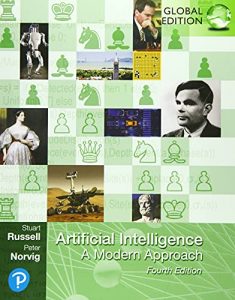
The top on our list of the best AI books is Artificial Intelligence: A Modern Approach by Peter Norvig and Stuart Russell. This is the reference to get started in artificial intelligence. The main algorithms are given in pseudo-code and explained. It’s ideal for following Massive Open Online Courses on artificial intelligence, for example.
It’s a great book to train yourself in this culture of neurons, and it is perfect for improvement in all intellectual activities. The book is essential for anyone who wants to get started in artificial intelligence. It takes up the evolution of this field and all the elements that lead us to today’s AI. The book explains and illustrates the different decision and search algorithms. All the other books on the subject pale in comparison to this book, which should be suitable for all types of readers. We consider it the bible of artificial intelligence.
What we liked
- Suitable for beginners and intermediate AI experience
- Rich information; more like an encyclopedia for AI
- Includes topics on machine learning and deep learning
What could be better
- There are a lot of concepts without mathematical explanations
Features:
- Author: Chris Sebastian
- Level of proficiency: Beginner
- of pages: 163
- Edition: January 1, 2019
- Publisher: Independently published
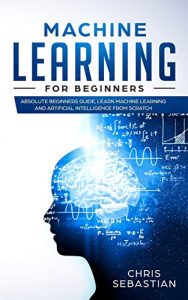
Written by Chris Sebastian, Machine Learning for Beginners is our budget pick for those looking for a short machine-learning book for beginners. It may have 163 pages of content and the paperback may sell for under $15, but it’s perhaps the best book for beginners who want to learn AI from scratch. In a complex topic like artificial intelligence, it can be an advantage if there is someone who teaches you the topic as easily as possible and that is exactly what this book is about.
You will learn a lot about the basics of AI, but it doesn’t end there, as some algorithms used by many companies in this field will also be introduced. However, there is some prior knowledge here, whereby already the upper-level knowledge is enough, which quite a lot of people have, and even if not, then you can still simply read up on a few things. At times, you may get a little lost in details or somewhat complex concepts, but it is still very interesting and gives a real knowledge base in AI.
What we liked:
- Many algorithms are presented
- A very affordable book
- There’s the free option with the Kindle and audiobook version
What could be better:
- Includes some typos which can be corrected
- It’s not detailed
Features:
- Author: Kevin P. Murphy
- Level of proficiency: Beginner/ Intermediate
- of pages: 864
- Edition: March 1, 2022
- Publisher: The MIT Press
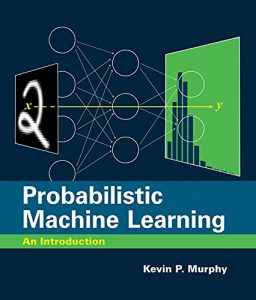
Fancy a book on probabilistic machine learning? Well, Kevin Murphy’s Probabilistic Machine Learning is our best pick for this field. Decisions are constantly made under uncertainty. This is due, among other things, to the fact that there is a lack of data or that the decision-making process cannot meaningfully include existing information. Depending on the question, these decisions can have different far-reaching consequences. Topics from the health sector or road traffic are particularly critical since they are not only associated with economic risks, but also with health risks.
With the increasing spread of machine learning (ML) to automate decision-making processes, these processes suddenly take on a new reach. While unsuitable advertising banners probably concern very few people seriously, the implications of autonomous driving, for example, are often the subject of intensive discussions. This book teaches you all this and more. However, unlike the previous book from Chris Sebastian, this book is very informative (864 pages), but it’s a bit on the high-end side. The Kindle version is not free too.
What we liked:
- It’s detailed; more like the Wikipedia of machine learning
- Artificial intelligence explained down to the basic
- Great for beginners and intermediate readers
What could be better:
- The printing quality could be better
Features:
- Author: Alyssa Simpson Rochwerger, Wilson Pang
- Level of proficiency: Beginner
- of pages: 222
- Edition: March 5, 2021
- Publisher: Lioncrest Publishing
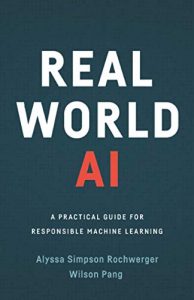
Alyssa Simpson Rochwerger and Wilson Pang’s Real World AI is the best book for learning in practice how artificial intelligence works in the real world. This practical guide offers a responsible human-first approach to AI. The approach has a high success rate compared to other approaches used in the industry.
This book offers you an all-rounder and takes care of all important topics in the field of artificial intelligence. Here you will not get a very deep but superficial introduction, in which you will learn something about many topics. The book has a total of 222 pages, which is not very much, but the price is very good. Still, the pages are written very compactly, and no space is wasted.
What we liked:
- All-rounder around AI without mincing words
- Everything is summarized briefly
- A different approach to AI; teaches how to solve problems with technology
- Very good price
What could be better:
- The authors could delve a bit more into the technical aspects
Features:
- Author: Ethem Alpaydin
- Level of proficiency: Beginner/ Intermediate
- of pages: 712
- Edition: fourth edition (March 24, 2020)
- Publisher: The MIT Press
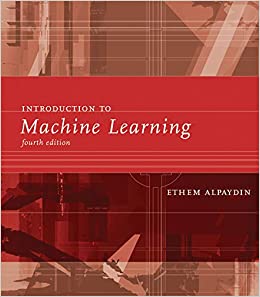
This book offers the best intro to machine learning in our opinion and it’s more detailed at that, combining practical examples and codes in up to 712 pages. Typically, machine learning means programming computers in such a way that a specific performance criterion is optimized using sample data and experience. This book discusses various methods that have their basis in various subject areas: statistics, pattern recognition, neural networks, artificial intelligence, signal processing, control, and data mining.
In the past, researchers have followed different paths with different focuses. The purpose of this book is to combine all of these different approaches to give an all-encompassing treatment of the problems and their proposed solutions.
What we liked:
- A great resource on machine learning
- Revised deep learning section
- Talks a lot about adaptive communication
What could be better:
- Requires some background in theoretical and statistical mathematics
Features:
- Author: Sebastian Raschka, Yuxi (Hayden) Liu, Vahid Mirjalili
- Level of proficiency: Intermediate/Advanced (in Python)
- of pages: 770
- Edition: February 25, 2022
- Publisher: Packt Publishing
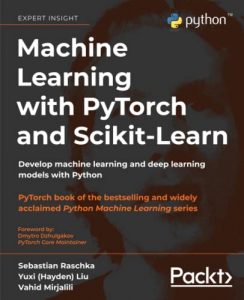
This is our best deep learning book for artificial intelligence professionals or at least those who have knowledge of python. The title of the book says it all, doesn’t it? If you are new to the subject and are looking for a complete introduction to machine and deep learning, this book is a good choice.
However, mathematical knowledge and programming skills especially in python are required so it’s not a book for beginners. But for those with intermediate experience, this book is one of the most easily understandable guides to the subject. If you like code snippets, you can buy the book. Those who would rather like to understand the methods should go for something else.
What we liked:
- The book covers numerous topics
- We liked that it covers the origin of machine learning
- Explains today’s deep learning architecture of today
- Very in-depth book
What could be better:
- It’s not broken down for beginners; you need some python and OOB knowledge to follow it
- The images could be colored
Features:
- Author: Luca Massaron, John Mueller
- Level of proficiency: Beginner
- of pages: 432
- Edition: 1st edition (May 31, 2016)
- Publisher: For Dummies
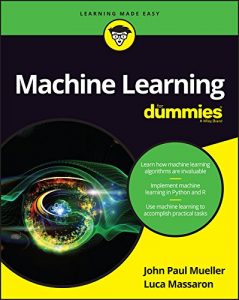
Machine Learning for Dummies is one of the best books on artificial intelligence for beginners. In the book, John Paul MUELLER and Luca Massaron tackle one of the important aspects related to AI and data analysis, to teach the fundamentals of this science fiction saga come true. Those who work in industries where data science is very present will find useful and practical information for implementing the Python language in the fields of data analysis and statistics.
This AI book also discusses Google Colab, a tool for writing Python code in the cloud. Random distributions, Probabilities, Hypothesis tests, or even Prediction models are on the menu of this book. You will therefore have understood that its reading requires prior experience with Python and statistical knowledge.
What we liked:
- A good introductory book for machine learning enthusiasts
- One of the best books to learn artificial intelligence
- Gets people with intermediate experience ingrained into the field
What could be better:
- Although it’s written for beginners, you still need some statistics and python experience
Features:
- Author: Laurence Moroney
- Level of proficiency: Beginner (programming experience required)
- of pages: 392
- Edition: 1st edition (October 27, 2020)
- Publisher: O’Reilly Medi
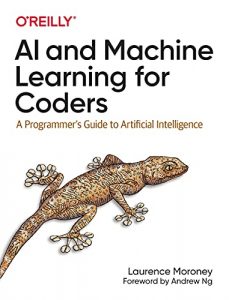
One of the best books on artificial intelligence for coders is AI and Machine Learning for Coders, written by Laurence Moroney. This is a book for beginners, but readers will need some programming experience. This book introduces the reader to the basic concepts and theories of machine learning, as well as real-world applications. It presents the essential programming languages and tools and makes it clear that machine learning is not magic, but can be used practically by everyone.
The book also includes sample codes readers can use to learn to recognize patterns and analyze results. Even from these small tasks and patterns, it can be deduced how versatile machine learning can be applied in everyday life, for example in the form of web searches, online advertising, e-mail filters, fraud detection tools, etc. With this book, you can take the first step into the world of machine learning. But you’d need some coding experience. It was written for coders.
What we liked:
- Very comprehensive, yet not too overwhelming
- Includes practical lessons
- A good guide for programmers
What could be better:
- Not for complete beginners
Features:
- Author: Terisa Roberts, Stephen J. Tonna
- Level of proficiency: Beginner
- of pages: 208
- Edition: 1st edition (September 27, 2022)
- Publisher: Wiley
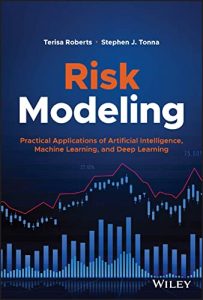
This is the best AI Book for those who want to learn about financial risk modeling in the field. With the increasing use of artificial intelligence (AI) and machine learning (ML), a comprehensive adaptation of this model-risk approach becomes necessary. Because in addition to the undisputed advantages, AI/ML approaches bring new, unique types of risks with them, which in our experience are not yet sufficiently taken into account in existing model risk management approaches.
This book covers all the basics of machine learning. It goes into the theory of the subject and illustrates it with practical application examples and case studies. Ideally, you should already have basic knowledge of analytics to read it. The different learning approaches of machine learning are presented, and algorithms, models, and use cases are listed for each learning concept, which demonstrates the implementation in practice.
What we liked:
- Written by a team of experts in SAS and risk modeling
- Technically rich in fewer pages
- Written for beginners
What could be better:
- Not enough introductory information
Features:
- Author: Tariq Rashid
- Level of proficiency: Beginner/ Intermediate
- of pages: 222
- Edition: 1st edition (March 31, 2016)
- Publisher: CreateSpace Independent Publishing Platform
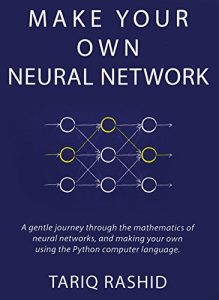
Make Your Own Neural Network is our best artificial intelligence book for learning neural networks. Neural networks are key elements of deep learning and artificial intelligence capable of amazing things today. They are the basis of many everyday applications such as speech recognition, face recognition on photos, or the conversion of speech into text. Yet few understand how neural networks work.
This book takes you on an entertaining journey that starts with very simple ideas and shows you step-by-step how neural networks work. First, you will learn about the mathematical concepts underlying neural networks. You don’t need any in-depth knowledge of mathematics for this, because all mathematical ideas are explained carefully and with many illustrations and examples. Then it goes into practice, after an introduction to the popular and easy-to-learn programming language Python, you gradually build your neural network with Python. You teach it to recognize handwritten numbers until it achieves a performance like a professionally designed mesh.
Tariq Rashid explains this difficult subject in an exceptionally clear and understandable manner, making neural networks accessible and practically understandable for anyone interested.
What we liked:
- Easy to follow and understand
- Great for those who want to enhance their skills
- Excellent and comprehensive intro for beginners
What could be better:
- Not so easy to read on iPhone
Features:
- Author: Andriy Burkov
- Level of proficiency: Beginner/ Intermediate
- of pages: 160
- Edition: Hard Cover ed. edition (January 11, 2019)
- Publisher: Andriy Burkov
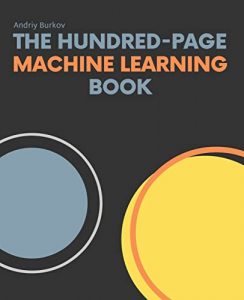
For those looking for a quick guide to machine learning, the Hundred Page Machine Learning Book is our choice of the best short machine learning book. Burkov has undertaken the very useful but almost impossible and extremely difficult task of reducing all machine learning to 150 pages.
This will be a great pick for the reader who is aware that these are the first 100 of the topic that they will read. It provides a solid introduction to the subject for beginners or those who have already begun but want to learn more.
What we liked:
- Short and concise book
- Great for starters who want to start with the basics
- Can be read in a single sitting
What could be better:
- You’d need a more in-depth book after finishing this
Features:
- Author: Frank Pasquale
- Level of proficiency: Beginner
- of pages: 344
- Edition: October 27, 2020
- Publisher: Belknap Press: An Imprint of Harvard University Press
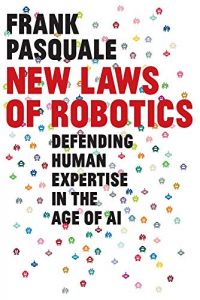
This is the best book on AI explained from the angle of the law. We are witnessing massive rapid transformations in Artificial Intelligence and its various applications in different fields. Is this a threat to human obsolescence? What about AI regulation? All these questions and more are addressed by Frank Pasquale in his book. In the New Laws of Robotics, he highlights the importance of creating teams or “collaborations” of humans and robots in different fields.
From the first chapters of the book on medicine, there is a very interesting set of partnerships developing between nurses and robots. One of them is a robot designed to help nurses lift patients, especially heavier ones, out of bed. This is a really important innovation because a lot of nurses have orthopedic problems because they are lifting extremely heavy patients or patients who are very vulnerable and need to be lifted very carefully. The robot is designed to allow the transfer of the patient from, for example, a bed to another bed, or a bed to a chair without placing excessive physical effort on the nurses. This is one of the things Pasquale calls the new law of robotics because AI and robotic systems should complement professionals and not replace them.
What we liked:
- This book won’t teach you AI, but it talks about the burning questions
- This a very handy book for those in the AI industry
- This book is on the side of humans amid the introduction of robotics in labor
What could be better:
- Not for those wanting to learn AI from scratch
Buying Guide
Artificial intelligence are machine processes designed to think and act like humans. In the review section, we’ve recommended books that talk about this topic, the challenges, and burning matters. Now, here’s a guide to choosing these books since not all are written for all types of readers.
What Are Your Goals?
We have several reasons for going into the or being in the AI field. The universe of artificial intelligence is so vast that there are now several categories of books dedicated to AI. Some books are more technical than others. Some books are more romantic than others. So, next, we are going to present to you the different families of books that you will be able to meet on this controversial discipline.
Technical Books on AI
This first category of work is more generally aimed at computer developers. It is a question of explaining the different techniques to be implemented to create programs equipped with artificial intelligence. It is a constantly evolving theoretical and practical field. It is recommended to have some basics in programming before reading such a book. Examples are the Machine Learning with PyTorch and Scikit-Learn and the AI and Machine Learning for Coders.
Books on Health and Artificial Intelligence
Some books are specialized in the specific field of health. This is the case in the book: Artificial Intelligence in Healthcare. This type of book reveals the impact that AI can or could have on the field of medicine. How could this technology strengthen the interventions of doctors on humans? The books covering AI usage in the health industry can cover that question.
Society Books
Other books focus on social phenomena such as the impacts that AI could have on management techniques, work, the future distribution of wealth, security in our cities, etc. A typical example is the New Laws of Robotics.
What’s Your Level of Proficiency?
As we have seen above, there are basic and advanced books on artificial intelligence, and the choice of one or the other must take into account your profile and your goals. Whether you want to enrich your general knowledge to update yourself on this more than ever topical subject, aspire to a career in AI, or are looking for reliable resources to enrich your knowledge as an expert in the field, your expectations must be clearly defined before you start looking for your book on artificial intelligence.
Beginner
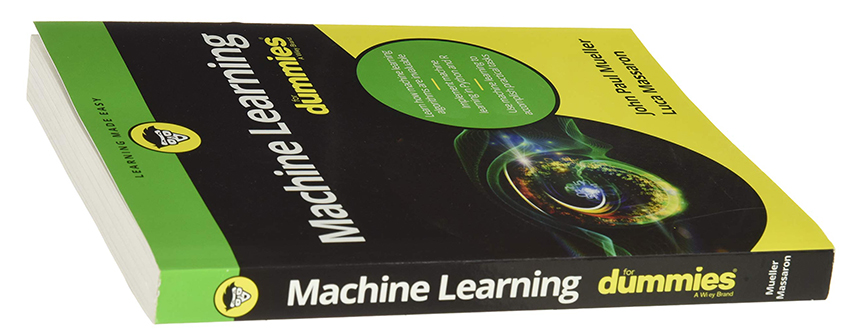
Beginner AI books are not in the real sense written for those who want to learn AI from scratch, or the languages used in AI. For most books written for beginners, from Risk Modeling to The Hundred-Page Machine Learning Book, you need the knowledge of python, statistics, and they’re in most cases practical. AI books are not like picking one of the best C# books which you can start without prior coding experience or knowledge of the language.
Intermediate
Some of the best AI books for intermediate AI persons are Make Your Own Neural Network and Probabilistic Machine Learning. By intermediate, we mean those who already know the basics of AI but need to learn more to get advanced.
Advanced
In the field of technology, it’s required professionals learn and relearn because innovation comes into the industry every day. So, for those who want to update their knowledge, one of the best is Machine Learning with PyTorch and Scikit-Learn.
Is the Book Up to Date?
A 2016 book in today’s real world is out of date. Choose for yourself books written recently because they’ll feature topics and issues with recency. Machine Learning with PyTorch and Risk Modeling by Terisa Roberts, both written in 2022 are some of the latest books in the industry.
Who’s the Author?
The authorship is perhaps the most important to consider. The first time you see a book title, check the name. If you’re not familiar with them, do quick research on their expertise. The best programming books or books on artificial intelligence have to be written by authors with authority in the field.
Some of the best authors in the field of artificial intelligence include:
- Max Tegmark
- Stuart J. Russell
- Nick Bostrom
- Ray Kurzweil
- Philip C. Jackson
- Pedro Domingos
- Paul Daugherty
- Peter Norvig
- Gary Marcus
- Geron Aurelien
FAQs
Where should I start learning about AI if I’m not a coder?
You should start by picking one of the best Python books for beginners. Then you can learn about statistical mathematics as some practical books require this knowledge. Also, you should choose no-code AI books like The Hundred-Page Machine Learning Book or Make Your Own Neural Network.
What are the types of AI?
The most common types of artificial intelligence are reactive, limited memory, theory of mind, and self-aware.
Reactive machines are, so to speak, the original type of weak AI. Reactive machines can perform a single task they were programmed to do. The IBM DeepBlue chess computer, for example, was one such machine. In 1997 she won against the then-reigning world chess champion. DeepBlue was able to weigh up all possible moves and thus always chose the move that led to checkmate the fastest – in its favor, of course.
Limited memory AI on the other hand can apply collected data from past situations to current events and include them in their decisions. Self-driving cars, for example, fall under this AI. They “know” how other cars normally behave on the road, what people or cyclists look like, and they know the rules of the road.
Theory of Mind AI belongs to the strong artificial intelligence and so far, only exists in theory. They will be able to perceive and understand human emotions and adapt their behavior to them. They will also have memories and be able to expand their view of the world based on what they have learned. The fourth type of AI comes closest to human consciousness: Such AI will perceive the world fully, they will understand human emotions, intentions, and reactions, and act accordingly. Self-awareness AI will also take the decisive step from “I think” to “I know that I think” and thereby approach human intelligence – maybe even surpass it.
Our Verdict
Remember that AI creeps into a variety of fields (public companies, the arts, healthcare, government services, the military, etc.) and raises questions for which you will have more or less interest. It would therefore be wise to choose a book you have a precise idea of the topics covered. With that in mind, be sure to check out reviews like the ones you’ll find on Amazon for example.
Again, our overall best artificial intelligence book is Artificial Intelligence: A Modern Approach by industry experts Peter Norvig and Stuart Russell. For us, this is the bible or encyclopedia of AI.
Machine Learning for Beginners is our budget pick and second-best artificial intelligence book. This means the value of this book is great despite having just 163 pages of content.
Probabilistic Machine Learning is our best pick for those who have knowledge of statistics, probabilities, and how they are used in machine learning.
References:
https://www.bestcolleges.com/blog/platforms-for-online-courses/
https://www.forbes.com/sites/cognitiveworld/2019/06/19/7-types-of-artificial-intelligence/
https://www.investopedia.com/terms/a/artificial-intelligence-ai.asp
